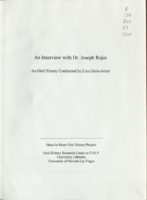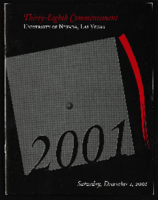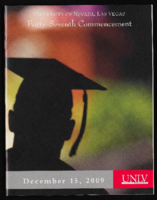Search the Special Collections and Archives Portal
Search Results

Transcript of interview with Susan Jones Watson by Claytee White, February 20, 2013
Date
Archival Collection
Description
A resident of Southern Nevada from the age of three, Susan Watson shares her memories of growing up and living in Las Vegas. After a year in Boulder City, Susan's father bought an old army barrack and converted it to a home in North Las Vegas; Susan remembers playing in the desert with her siblings and attending elementary and middle school before starting at Rancho High. Watching her mother design costumes for Strip performers and beautiful dresses for her own high school dances no doubt helped Susan develop her own sense of taste and style - something that she would put to good use over many years as an interior designer. Before that though, Susan shares her memories of what life was like in the Las Vegas of the 1950s and 1960s: cruising Fremont Street; movie nights; after-school work; favorite teachers; lunches on the lawn; and dance club. All combine to paint a vivid picture of a smaller town and a simpler time in the Las Vegas valley.
Text

Transcript of interview with Dr. Joseph Rojas by Lisa Gioia-Acres, September 30, 2008
Date
Archival Collection
Description
Dr. Joseph Rojas, born 1933 in Alexandria, Louisiana, was the son of Joseph Edward Rojas and wife Carroll. He graduated high school at age 16 and entered Loyola University of the South. Two years later he was accepted at Louisiana State University School of Medicine, graduating with a medical degree in 1957. He interned at Charity Hospital and then completed his OB-GYN residency at Tulane University. Several mentors worked with Dr. Rojas during his residency and he recalls learning surgical and bed-side skills from the likes of Dr. Lynn White and Dr. Fred Janson. He also remembers the very high volume of patients - up to 300 - that he and other residents saw daily. Dr. Rojas married Mona Robicheaux, RN, during his residency and afterwards joined the Air Force. He and his family — they eventually had six children — were stationed at Nellis Air Force Base, arriving in Las Vegas in 1961. He was chief of OBGYN and deputy hospital commander while at Nellis and then served as chief of OBGYN at Southern Nevada Memorial Hospital until 1972. He later served as chief of staff at Women's Hospital and Valley Hospital, and was the first chief of staff at Summerlin Hospital. Dr. Rojas also maintained a private practice outside of the hospital. His wife worked alongside him in his office, and they share memories and anecdotes of the patients they saw and the general atmosphere of the medical community. Both Joseph and Mona agree that Las Vegas hospitals were less racially segregated than the hospitals in Louisiana, and felt that the West was more open to integration. In 1966 Dr. Rojas started the first OB-GYN residency in Nevada, which led to the development of the University of Nevada School of Medicine. He was a researcher, lecturer, teacher, and author. He earned many awards, including the Harold Feikes MD Award for Outstanding Physician in Clark County (2001), and the Nevada State Medical Association Distinguished Physician Award (1980). Dr. Rojas passed away in May of 2009, leaving behind an incredible legacy of service to the residents of Clark County.
Text

Kaku Makino and Masako "Julie" Ishitsuka oral history interview: transcript
Date
Archival Collection
Description
Oral history interview with Kaku Makino and Masako "Julie" Ishitsuka conducted by Kristel Peralta, Vanessa Concepcion, Ayrton Yamaguchi, and Stefani Evans on March 22, 2021 for the Reflections: The Las Vegas Asian American and Pacific Islander Oral History Project. In this interview, Makino discusses his early life in Tokyo, Japan and becoming a chef. He recalls arriving to the United States in 1989, establishing the Todai (now Makino Sushi & Seafood Buffet) restaurant chain, and opening nineteen locations in California, Florida, and in Hawaii. Kano talks about her upbringing in Otsu, Shiga Prefecture, Japan and describes Japan during the Meiji era. She remembers arriving to Las Vegas, Nevada in 2000 and the cultural change she experienced. Lastly, Makino and Kano discuss the restaurant industry during the COVID-19 pandemic.
Text

Alpha Kappa Alpha Sorority, Theta Theta Omega Chapter "Tea Rose Talk" newsletters
Date
Archival Collection
Description
From the Alpha Kappa Alpha Sorority, Incorporated, Theta Theta Omega Chapter Records (MS-01014) -- Chapter records file.
Text
Union Pacific Railroad Collection
Identifier
Abstract
The Union Pacific Railroad Collection (1828-1986) is comprised of the original corporate records of the Union Pacific Railroad's operations in Southern Nevada, Utah, and Southern California, particularly focusing on Las Vegas and Los Angeles. The collection documents the purchase of Stewart ranch and the construction of the original depot and town which became modern Las Vegas. The collection also contains the records of the Las Vegas Land & Water Company (LVL&W), a subsidiary of the railroad formed in 1905 to handle the railroad's land transactions. The collection contains office files, correspondence, reports, leases, various legal, governmental and financial document, the collection contains large and small format maps, architectural and engineering drawings, published technical reports, railroad operational manuals, bound legal briefs, ledgers, and payroll and receipt books. The collection also includes the personal files of Walter Bracken, the Union Pacific's special representative in Nevada and vice president of the Las Vegas Land and Water Company, and a paper index of the collection materials.
Archival Collection

Dana Su Lee oral history interview: transcript
Date
Archival Collection
Description
Oral history interview with Dana Su Lee conducted by Stefani Evans, Vanessa Concepcion, and Cecilia Winchell on February 10, 2021 for Reflections: The Las Vegas Asian American and Pacific Islander Oral History Project. Dana talks about her childhood growing up in California and her parents who were both born in China. She discusses her educational background and her move to Las Vegas with her husband in 1997. Dana also shares her various community and philanthropic pursuits related to education and the arts. Subjects discussed include: Greg Lee; otherness; Nevada Women's Philanthropy (NWP)
Text

University of Nevada, Las Vegas (UNLV) 38th commencement program
Date
Archival Collection
Description
Commencement program from University of Nevada, Las Vegas Commencement Programs and Graduation Lists (UA-00115).
Text

David Becker oral history interview: transcript
Date
Archival Collection
Description
Oral history interview with David Becker conducted by Claytee D. White and Barbara Tabach on May 15, 2018 for the Remembering 1 October Oral History Project. In this interview, Becker recalls being on a three-day assignment at the Route 91 Harvest Country Music Festival across from the Mandalay Bay Resort in Las Vegas, Nevada. Thinking the gunfire was produced by malfunctioning equipment, he took photos of the scattering crowd. Moments later, in a now silent venue, he realized he captured a horrific massacre. Becker recalls photographing people leaving the venue as they performed acts of heroism, helping the fallen or the slow to reach safety. He discusses how difficult it is to comprehend the acts of that night, and how his photojournalist instincts allowed him to capture such devastating images.
Text

Ernest Oon oral history interview: transcript
Date
Archival Collection
Description
Oral history interview with Ernest Oon conducted by Cecilia Winchell, Stefani Evans, and Jerwin Tiu on February 16, 2023 for the Reflections: the Las Vegas Asian American and Pacific Islander Oral History Project. In this interview, Oon recalls his childhood in Singapore, where his father worked on the Health and Sports Council for the Singaporean Government and his mother worked as a television assistant producer. Growing up, Oon recalls being very active, participating in everything from soccer to Tae Kwon Do. In an effort to continue his education without being being interrupted by Singapore's civil service program, Oon applied to college in the United States and ended up attending California State University. Although he was on the medicine track in Singapore, he switched to finance. After a series of jobs within credit banking, he is now a chief credit officer for Bank of Nevada. Throughout the interview, Oon reflects on the changes in his life living in different places, the street food from Singapore, and his unique tennis game.
Text

University of Nevada, Las Vegas (UNLV) 47th commencement program
Date
Archival Collection
Description
Commencement program from University of Nevada, Las Vegas Commencement Programs and Graduation Lists (UA-00115).
Text
